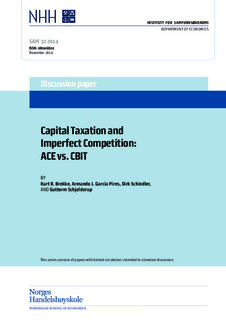| dc.contributor.author | Brekke, Kurt R. | |
| dc.contributor.author | Pires, Armando José Garcia | |
| dc.contributor.author | Schindler, Dirk | |
| dc.contributor.author | Schjelderup, Guttorm | |
| dc.date.accessioned | 2014-11-12T12:42:41Z | |
| dc.date.available | 2014-11-12T12:42:41Z | |
| dc.date.issued | 2014-11 | |
| dc.identifier.issn | 0804-6824 | |
| dc.identifier.uri | http://hdl.handle.net/11250/225799 | |
| dc.description.abstract | This paper studies the market and welfare effects of two main tax reforms – the
Corporate Business Income Tax (CBIT) and the Allowance for Corporate Equity
tax (ACE). Using an imperfect-competition model for a small open economy, it
is shown that the well-known neutrality property of ACE does not hold. Both
corporate tax regimes distort market entry and equilibrium prices. A main result is
that a small open economy should levy a positive source tax on capital in markets
with free firm entry. Which tax system is better from a welfare point of view,
depends on production technology, the competitive effects of ACE and CBIT, and
whether entry is excessive or suboptimal at the given corporate tax rate. Imposing
tax income neutrality yields a higher corporate tax rate with ACE, which increases
the scope for CBIT to be welfare improving. | nb_NO |
| dc.language.iso | eng | nb_NO |
| dc.publisher | SAM | nb_NO |
| dc.relation.ispartofseries | Discussion paper;32/14 | |
| dc.subject | optimal corporate taxation | nb_NO |
| dc.subject | corporate tax reform | nb_NO |
| dc.subject | imperfect competition | nb_NO |
| dc.subject | ACE | nb_NO |
| dc.subject | CBIT | nb_NO |
| dc.title | Capital taxation and imperfect competition : ACE vs. CBIT | nb_NO |
| dc.type | Working paper | nb_NO |
